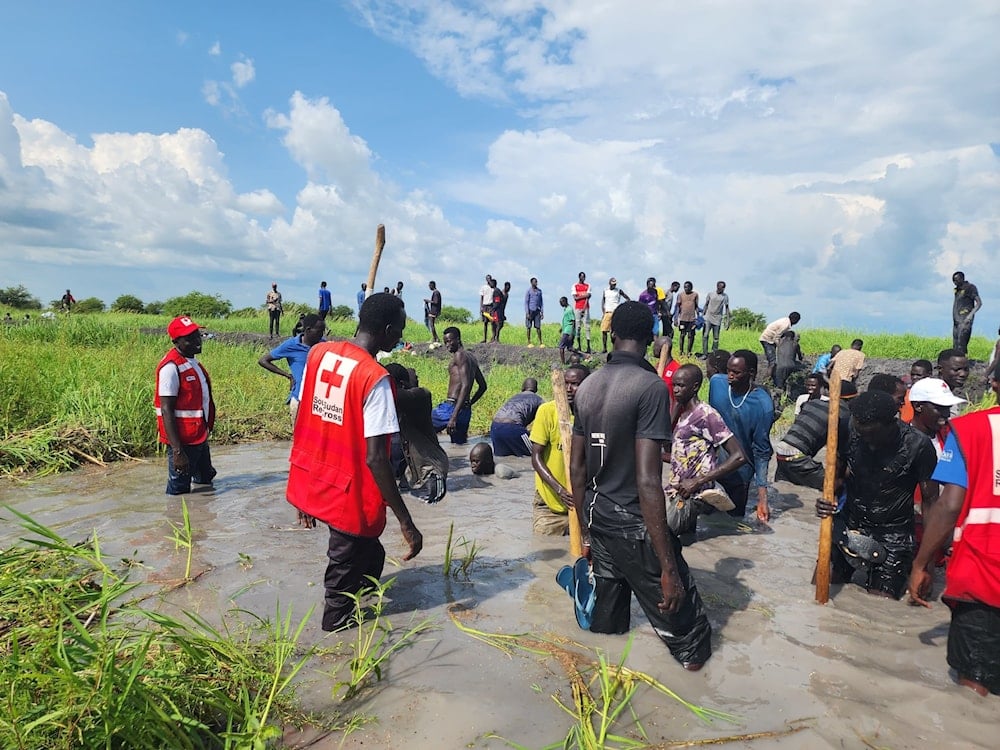IFRC 'horrified' by killing of five Sudanese aid workers on duty
Red Crescent volunteers were targeted while delivering food in North Kordofan, as violence against humanitarian workers in Sudan escalates.
-

Alongside local Community Disaster Response Teams, SSRCS is tirelessly repairing & reinforcing dykes in New Fangak, offering hope and protection to flood-surrounded communities on November 27, 2024 (@IFRCAfrica /X)
The International Federation of Red Cross and Red Crescent Societies (IFRC) has condemned the killing of five Sudanese Red Crescent (SRC) volunteers who were on duty in the city of Bara, North Kordofan, on October 27, calling the incident “horrifying” and “unacceptable".
According to the IFRC, the volunteers were part of a food distribution team and were clearly identified by their Red Crescent vests and official ID cards when they came under attack. Three other team members remain missing.
“These individuals were performing life-saving humanitarian work. Any attack on humanitarian teams is unacceptable,” the IFRC said in a statement, urging all parties to the conflict to respect the Red Cross and Red Crescent emblems and the principles of neutrality and protection they represent.
💔 Heartbroken & Horrified
— IFRC Africa (@IFRCAfrica) October 28, 2025
Our hearts are shattered by the killing of 5 Sudanese Red Crescent volunteers in Bara, North Kordofan on 27 October. They were clearly identified delivering food.
This is unacceptable.
Since the conflict began, we have lost 21 @SRCS_SD colleagues.… pic.twitter.com/m9IiaQgmVn
The organization extended its condolences to the victims’ families and colleagues, describing the loss as a devastating blow to the humanitarian community.
The Sudanese Red Crescent has now lost 21 staff and volunteers since the conflict erupted, highlighting the extreme dangers faced by aid workers in the country. Globally, 25 Red Cross and Red Crescent personnel have been killed so far this year while carrying out humanitarian duties.
UN urges urgent action as Sudan crisis deepens
The United Nations has called on Saturday for urgent global action amid the worsening Sudan humanitarian crisis, where armed clashes have continued for more than 900 days and some 30 million people now require humanitarian assistance.
The appeal was made jointly on Friday by UNICEF, the International Organization for Migration (IOM), the World Food Programme (WFP), and the UN High Commissioner for Refugees (UNHCR).
"Over 900 days of brutal fighting, widespread violations of human rights, famine, and the breakdown of life-sustaining services have pushed millions to the brink of survival, particularly women and children … The humanitarian community stands ready, but it cannot act alone. The world must step up," the joint UNICEF Sudan statement read.
Agencies urged immediate access for relief convoys, stronger resource mobilization, and a concerted effort to end hostilities.
Although around 2.6 million people have returned to their homes following reduced fighting in Khartoum and other areas, many found their houses destroyed and essential services collapsed.
According to the IOM, more than a million people have re-entered the capital since early 2025, straining limited infrastructure. UNICEF added that 14 million children, roughly 80 percent of the country’s youth, are now out of school.
Funding shortages threaten humanitarian response
The UN warned that the 2025 Humanitarian Response Plan for Sudan, valued at $4.2 billion, is only 25 percent funded, severely limiting relief operations. The UN Sudan aid appeal noted that “funding shortfalls are compounding the crisis,” threatening food deliveries, healthcare, and shelter programs.
The World Health Organization (WHO), meanwhile, reported outbreaks of cholera and dengue fever infecting more than 37,000 people and leaving 100 dead.
Experts from the UN Human Rights Office expressed alarm at drone strikes targeting civilians and infrastructure, killing at least 88 people in El-Fasher and Kordofan in October. The UN recorded 49 attacks on medical facilities in 2025 alone, resulting in 966 deaths, while between 2023 and 2025, 186 attacks on hospitals killed 1,204 people.
Fighting between the Rapid Support Forces (RSF) and the Sudanese army has raged since April 2023. In March, the army claimed to have expelled RSF units from Khartoum, but the rebels intensified assaults in western and southern Sudan the following month, declaring a rival administration.
As famine spreads and disease outbreaks multiply, the UN warned that the Sudan humanitarian crisis could become the world’s largest unless global donors and powers act swiftly to restore access, accountability, and peace.

 4 Min Read
4 Min Read










